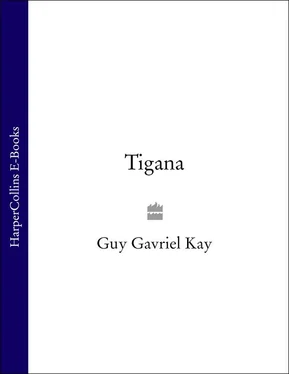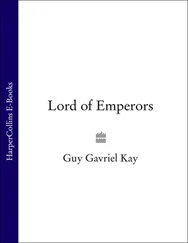Tomasso began commissioning and collecting walking sticks with heads carved in the shape of the male organs of sex. It was rumoured that he’d had some of his young friends model for the carvers. Sandre hunted. Gianno, the heir, consolidated a burgeoning reputation as a genial, uncomplicated seducer of women and breeder of children, legitimate and illegitimate. The younger Sandreni were allowed to maintain modest homes in the city as part of Alberico’s overall policy to be as discreet a ruler as possible—except when danger or civil unrest threatened him.
At which time children might die on sky-wheels. The Sandreni Palace in Astibar remained very prominently shuttered, empty and dusty. A useful, potent symbol of the fall of those who might resist the Tyrant. The superstitious claimed to see ghostly lights flickering there at night, especially on a blue-moon night, or on the spring or autumn Ember Nights when the dead were known to walk abroad.
Then one evening in the country Sandre had told Tomasso, without warning or preamble, that he proposed to die on the eve of the Festival of Vines two autumns hence. He proceeded to name the two lords who were to be his vigil-keepers, and why. That same night he and Tomasso decided that it was time to tell Taeri, the youngest son, what was afoot. He was brave, not stupid, and might be necessary for certain things. They also agreed that Gianno had somehow sired one likely son, albeit illegitimate, and that Herado—twenty-one by then and showing encouraging signs of spirit and ambition—was their best hope of having the younger generation share in the unrest Sandre hoped to create just after the time of his dying.
It wasn’t, in fact, a question of who in the family could be trusted: family was, after all, family. The issue was who would be useful and it was a mark of how diminished the Sandreni had become that only two names came readily to mind.
It had been an entirely dispassionate conversation, Tomasso remembered, leading his father’s bier southeast between the darkening trees that flanked the path. Their conversations had always been like that; this one had been no different. Afterwards though, he had been unable to fall asleep, the date of the Festival two years away branded into his brain. The date when his father, so precise in his planning, so judicious, had decided he would die so as to give Tomasso a chance to try again, a different way.
The date that had come now and gone, carrying with it the soul of Sandre d’Astibar to wherever the souls of such men went. Tomasso made a warding gesture to avert evil at that thought. Behind him he heard the steward order the servants to light torches. It grew colder as the darkness fell. Overhead a thin band of high clouds was tinted a sombre shade of purple by the last upward-angled rays of light. The sun itself was gone, down behind the trees. Tomasso thought of souls, his father’s and his own. He shivered.
The white moon, Vidomni, rose, and then, not long after, came blue Ilarion to chase her hopelessly across the sky. Both moons were nearly full. The procession could have done without torches in fact, so bright was the twinned moonlight, but torchlight suited the task and his mood, and so Tomasso let them burn as the company cut off the road on to the familiar winding path through the Sandreni Woods, to come at length to the simple hunting lodge his father had loved.
The servants laid the bier on the trestles waiting in the centre of the large front room. Candles were lit and the two fires built up at opposite ends of the room. Food, they had set up earlier that day. It was quickly uncovered on the long sideboard along with the wine. The windows were opened to air the cabin and admit the breeze.
At a nod from Tomasso the steward led the servants away. They would go on to the manor further east and return at daybreak. At vigil’s end.
And so they were left alone, finally. Tomasso and the lords Nievole and Scalvaia, so carefully chosen two years before.
‘Wine, my lords?’ Tomasso asked. ‘We will have three others joining us very shortly.’
He said it, deliberately, in his natural voice, dropping the artificial, fluting tone that was his trademark in Astibar. He was pleased to see both of them note the fact immediately, their glances sharpening as they turned to him.
‘Who else?’ growled bearded Nievole who had hated Sandre all his life. He made no comment on Tomasso’s voice, nor did Scalvaia. Such questions gave too much away, and these were men long skilled in giving away very little indeed.
‘My brother Taeri and nephew Herado—one of Gianno’s by-blows, and much the cleverest.’ He spoke casually, uncorking two bottles of Sandreni red reserve as he spoke. He poured and handed them each a glass, waiting to see who would break the small silence his father had said would follow. Scalvaia would ask, Sandre had said.
‘Who is the third?’ Lord Scalvaia asked softly.
Inwardly Tomasso saluted his dead father. Then, twirling his own glass gently by the stem to release the wine’s bouquet, he said, ‘I don’t know. My father did not name him. He named the two of you to come here, and the three of us and said there would be a sixth at our council tonight.’
That word too had been carefully chosen.
‘Council?’ elegant Scalvaia echoed. ‘It appears that I have been misinformed. I was naively of the impression that this was a vigil.’ Nievole’s dark eyes glowered above his beard. Both men stared at Tomasso.
‘A little more than that,’ said Taeri as he entered the room, Herado behind him.
Tomasso was pleased to see them both dressed with appropriate sobriety, and to note that, for all the suavely flippant timing of Taeri’s entrance, his expression was profoundly serious.
‘You will know my brother,’ Tomasso murmured, moving to pour two more glasses for the new arrivals. ‘You may not have met Herado, Gianno’s son.’
The boy bowed and kept silent, as was proper. Tomasso carried the drinks over to his brother and nephew.
The stillness lasted a moment longer, then Scalvaia sank down into a chair, stretching his bad leg out in front of him. He lifted his cane and pointed it at Tomasso. The tip did not waver.
‘I asked you a question,’ he said coldly, in the famous, beautiful voice. ‘Why do you call this a council, Tomasso bar Sandre? Why have we been brought here under false pretences?’
Tomasso stopped playing with his wine. They had come to the moment at last. He looked from Scalvaia over to burly Nievole.
‘The two of you,’ he said soberly, ‘were considered by my father to be the last lords of any real power left in Astibar. Two winters past he decided—and informed me—that he intended to die on the eve of this Festival. At a time when Alberico would not be able to refuse him full rites of burial—which rites include a vigil such as this. At a time when you would both be in Astibar, which would allow me to name you his vigil-keepers.’
He paused in the measured, deliberate recitation and let his glance linger on each of them. ‘My father did this so that we might come together without suspicion, or interruption, or risk of being detected, to set in motion certain plans for the overthrow of Alberico who rules in Astibar.’
He was watching closely, but Sandre had chosen well. Neither of the two men to whom he spoke betrayed surprise or dismay by so much as a flicker of a muscle.
Slowly Scalvaia lowered his cane and laid it down on the table by his chair. The stick was of onyx and machial, Tomasso found himself noticing. Strange how the mind worked at moments such as this.
‘Do you know,’ said bluff Nievole from by the larger fire, ‘do you know that this thought had actually crossed my mind when I tried to hazard why your Triad-cursed father—ah, forgive me, old habits die hard—’ His smile was wolfish, rather than apologetic, and it did not reach his narrowed eyes. ‘—why Duke Sandre would name me to hold vigil for him. He must have known how many times I tried to hasten these mourning rites along in the days when he ruled.’
Читать дальше












